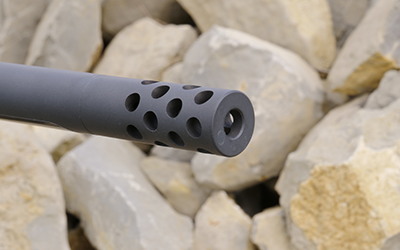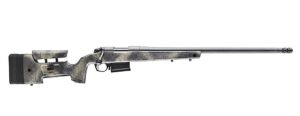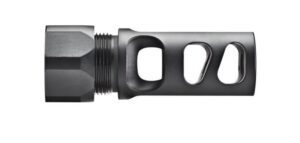Do you really need a muzzle brake?

Do you really need a muzzle brake?
This blog is the second blog of firearm terminology we often hear in the hunting and shooting industry. I’ll go over some of these terminology listed below for each blog segment in this series for the next few months.
- Free Floating Barrel
- Muzzle Brake and Flash Suppressor
- Fluting
- Bedding
- Rifling
- Bore-Sight
- Suppressors, Moderators, Silencers
Keep in mind there are a lot of terms and acronym related to this industry that isn’t on here. I will highlight the most common words and discuss a few on each topic to explain what those words are and its meaning within the limits of a blog without turning it into a book.
What’s a muzzle brake, flash suppressor?
Muzzle attachment such as a brake comes in different sizes and shapes. It can help the shooter focus more on their basic marksmanship fundamentals and help improve accuracy by reducing felt recoil. A muzzle brake and a flash suppressor is a steel tube or clam shape device built for various rifles with special cuts and ports to help redirect gases and or flash coming from the muzzle to reduce certain key functions through the final shooting process by dispersing those gases and muzzle flash through ports or special cuts on the device.

The Bergara OMNI multi-directional (radial) muzzle brake will help tame the recoil of a rifle by up to 35%.
Muzzle Brake
Basically a muzzle brake redirects the gas coming out of the barrel through the ports and cuts of the brakes. Where those ports are cut on the brake itself will determine the effects of the brake and how much reduction or jumps it will reduce based on its design, intents and purposes.
Flash Suppressor
A flash suppressor works by dispersing the muzzle flash. Modern flash suppressor design can also help in the reduction of recoil as it overlaps certain key design of a muzzle brake. Flash suppressors are more commonly used by the military to also help reduced the visual location of the rifle flash from being seen by an enemy. Law enforcement and military carbine rifles will sometimes be fitted with a flash suppressor to help reduce flash blindness due to the close proximity of the shorter barrel to the shooter.
What are the Pros and Cons of these attachments?
Pros: when it comes down to the advantages of having a muzzle brake, especially when we talk about the various types of brakes, they all have one thing in common, and that is to reduce recoil. Let’s go over some pros on muzzle brakes.
- Can help you get back on a target a lot quicker.
- Can help shooter spot the point of impact by reducing muzzle jump.
- Improved accuracy by reducing felt recoil, especially for new shooters.
Cons: There are really no hard disadvantages. To most shooters, the pros outweigh the cons. Let’s go over a few of them that I think needs to be looked at and you can decide for yourself if it’s worth having one or not.
- They will add additional length and slight weight to your rifle.
- Loud noise and potential damage to your ears if you don’t take extra precaution by using ear-protection.
- Will affect the way your rifle shoots for good or bad.
With a wide variety of muzzle brakes to choose from in various style and cuts, it’s best to further your research on what brakes will work best for you. The more common multi-directional brakes (radial ported) provide the least reduction while “bastard style” or rear angle cuts will provide more reduction. Understanding the types of brakes and the way it was built and designed for will greatly help you decide on the types of brakes you’ll need for your shooting intents and purposes.

Angle baffle brakes similar to the TP1 brake from Bergara Rifles International (picture above) will not only help reduce felt recoil, but also keep ground dust-off at a minimum due to its design.
Issues and Problem Solving
There are reports of muzzle devices being the culprit of accuracy problems on a rifle. Take that into consideration the next time you’re at the range shooting your rifle with a new muzzle brake and your group opens up more than usual. If you’re running an older brake, check for carbon build up in the channel and the ports and clean as needed. Improper size brakes, poor quality, installation misalignment and bad threads can hinder the effectiveness of any brakes and can cause some serious injuries.
When selecting a muzzle brake, my suggestion is to select one based on its functionality, intents and purposes and not purely by the looks or how cool it is on a rifle.
Whatever your opinions are about muzzle brakes, it’s always great to have a good debate or discussion about hunting, shooting and firearms. Tell me what you think about this topic and whether a muzzle brake makes a world of difference based off your shooting style and experiences.
About the Author
Al Louangketh is the Bergara Rifles International Pro Team manager and Senior Editor for the Bergara Rifles International blog. He holds a PhD in Wildlife Science and is a retired U.S Army Veteran living in Germany.
Feel free to contact him for any questions you may have.
